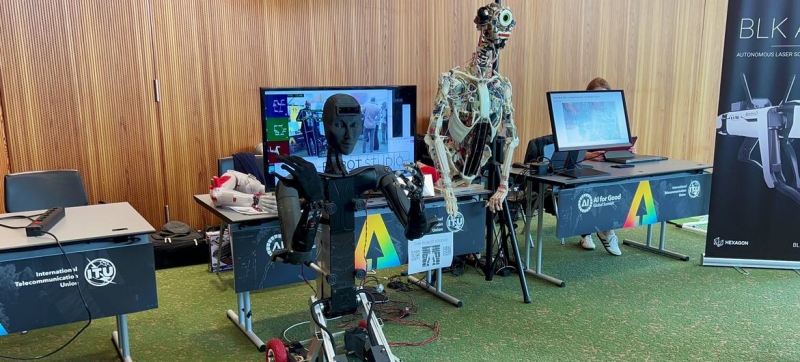
A fragment of the exhibition at the AI for Good summit. Global AI Summit participants focus on combating disinformation Sustainable Development Goals
The question of how to protect society from so-called deepfakes was one of the key topics of discussion at the UN conference on artificial intelligence in Geneva this week. The AI for Good summit was attended by 25 thousand enthusiasts – and robots – from 145 countries.
AI for Good is the UN’s leading platform promoting artificial intelligence technology to improve health and climate, promote inclusive prosperity, sustainable infrastructure and other global development priorities.
Speaking at the conference , Frederick Werner, head of strategic engagement at the UN International Telecommunication Union, stressed the need to develop standards to combat disinformation and deepfakes.
“There are different methods for doing this,” he said. – For example, a watermark is essentially an invisible signature or, in other words, a digital fingerprint. They can be used to determine whether a piece of digital media has been modified – be it a photograph, audio recording or video – or whether it was completely generated by artificial intelligence.”
With the target of achieving the Sustainable Development Goals less than 10 years away, the summit looked at ways to accelerate progress towards the SDGs. At the beginning of the conference, a full day was devoted to issues of artificial intelligence management.
Robots and people
One of the most popular participants at the conference is the humanoid robot Desdemona, or “Desi,” endowed with artificial intelligence.
“I can play a critical role in identifying fakes and preventing them from spreading, but it is also important for people to be vigilant and check information before sharing it,” she said. – Deepfakes are often difficult to distinguish from real materials, but we should not let fear control us. Instead, we need to focus on developing and implementing tools to detect and combat fakes and continue to educate people about the importance of double-checking information.”
Broad representation
The AI for Good Summit brought together industry, innovators, governments, academia and non-governmental organizations to develop a framework that will enable artificial intelligence to evolve based on ethical principles, human rights and the rule of law.
Many of those who discuss the pros and cons of AI agree that the enormous potential of artificial intelligence cannot be left to those who would manipulate it for power or profit. Regulation will be required to ensure that this technology is available to everyone on equal terms.
“We need to create a framework for the development of artificial intelligence,” said Gabriela Ramos, UNESCO Assistant Director-General for Social and Human Sciences. “We must expand the ability of governments to create such frameworks, the ability of small and medium-sized enterprises to implement them, so that artificial intelligence does not breed inequality.”
